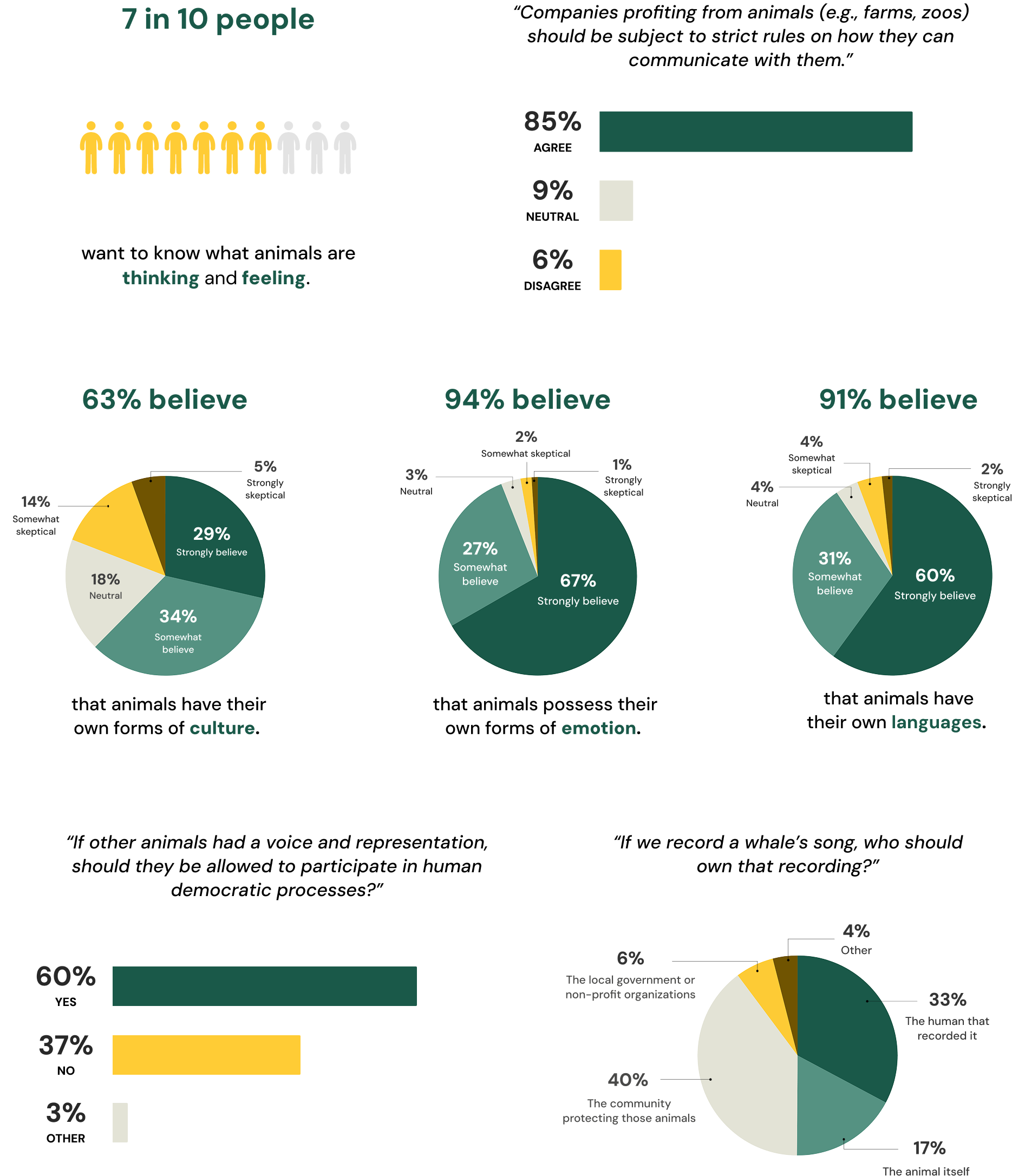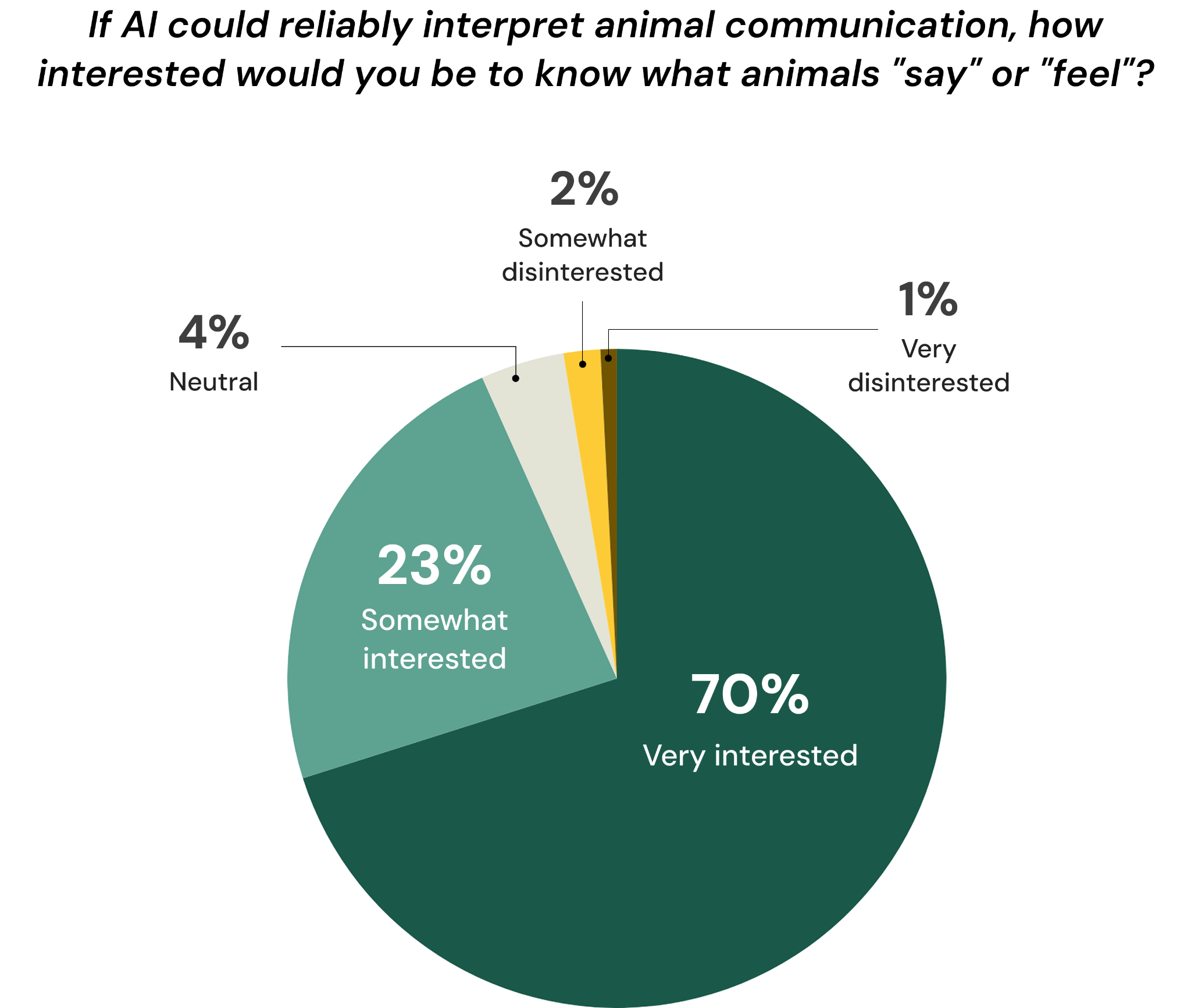What the World Thinks About AI and Animal Communication: Findings from Our First Global Survey


Key Takeaways
- For the first time in history, we asked the world what it wants from a future where AI helps us understand animal communication.
- We partnered with The Collective Intelligence Project to conduct a first-of-its-kind global survey on AI-powered interspecies understanding.
- We surveyed 1,057 people across 67 countries to understand public sentiment on using AI to decode animal communication.
- The data reveal a complex global public curious about the inner lives of other species, while also grappling with the profound questions raised by AI and its potential impact on our relationship with the rest of nature.
Read the full report here.
The World Is Ready to Listen
We're at a critical inflection point in our relationship with the rest of nature. The urgent global polycrisis we face is being fueled by an increasing disconnection from our fellow species. This disconnection has led to deepening inequality alongside staggering biodiversity loss and a weakening of our planet’s resilience that threatens the very survival of life on Earth.
At the same time, the first large language models for analyzing animal communication are emerging. The technology is progressing rapidly and we're on the cusp of breakthroughs that could fundamentally transform our relationship with other animals.
As AI helps us discover new insights about animal communication and intelligence, we recognized a rare opportunity to invite society to help us steer the direction of this technology rather than react after it’s already entrenched.
To that end, we recently partnered with The Collective Intelligence Project, a research organization specializing in democratic participation and collective decision-making at scale, to understand public sentiment on using AI to decode animal communication. We surveyed 1,057 participants across 67 countries in 8 languages. Participants engaged in a mix of standard polling, open-ended prompts, and peer-voting to surface consensus and disagreement.
"Lasting, mutually beneficial change in our relationship with nonhuman animals requires meaningful public engagement. This foundational report exemplifies the importance and richness of connecting the public to AI-based efforts to understand and respond to animals, ensuring that ethical frameworks and inclusive dialogue guide technological advances."
–Melanie Challenger & Erin Ryan, Co-Founders of Animals in the Room (AiR)
Taken together, the data reveal a complex global public curious about the inner lives of other species, while also grappling with the profound questions raised by AI and its potential impact on our relationship with the rest of nature.

The Universal Language of Curiosity
"This global dialogue demonstrates what we at Nature Perspectives encounter daily: people everywhere are eager to understand what animals feel and say."
–Gal Zanir, Co-Founder & CEO, Nature Perspectives
The results of the report reveal something beautiful: humanity's deep curiosity about our fellow species remains intact despite the increasing divide between humans and the rest of nature. 70% of respondents had a strong interest in knowing what animals are thinking and feeling. This finding reflects a fundamental recognition that animals have rich inner lives worth understanding.

Across cultures and continents, people believe animals possess their own forms of emotion (94% somewhat or strongly agree), language (91% somewhat or strongly agree), and even culture (63% somewhat or strongly agree).
The finding around culture is particularly notable given that animal culture has only recently gained scientific recognition, with mounting evidence showing complex cultural transmission in species from dolphins to primates to birds. In fact, it’s only in the last year or so that culture has started to be recognized by the conservation community as significant for influencing conservation outcomes.
This widespread recognition of the rich interior lives of other animals creates fertile ground for the responsible development of technologies to decode animal communication. When people already believe animals have something meaningful to say, they're more likely to support efforts to help us listen.
Technology Optimism Tempered By Responsible Caution
While the public expresses enthusiasm for AI-powered animal communication, their optimism is tempered by concerns of human misuse. Respondents worry most about people exploiting, manipulating, or harming animals for commercial gain or selfish motives.
This concern translates into a desire for strong regulation. 85% of respondents believe companies that profit from animals should face strict rules about how they use technology for interspecies communication.
The technology's perceived benefits center on harmony and conservation. As one participant noted with 77% agreement: "The most profound change would be a paradigm shift from human-centric to ecocentric governance. Laws would prioritize ecological balance over short-term economic gains, reshaping industries like agriculture, urban development, and energy."
Democracy Beyond Humans
"This report provides valuable insights into public perception of other creatures within the context of law and governance, crucial for effective advocacy and political action. The results will have a significant impact on my work at the nexus of policy and culture."
–Jonathon Keats, Principal Philosopher, Earth Law Center
Perhaps most surprisingly, the survey revealed significant openness to including animals in democratic processes. 60% of respondents believe animals should participate in human democracy in some capacity—whether through direct voting on issues affecting them, advisory roles, or representation through human proxies.
When asked which decisions should be informed by nature's voices, respondents prioritized environmental laws (77%) and agriculture/food systems (62%). There's less consensus on whether animals should influence urban planning, health policy, or education, but substantial minorities support even these applications.
This openness to multispecies democracy suggests public readiness for governance models that incorporate non-human perspectives – something we’ve been thinking about with our partners at Earth Law Center.
Who Owns a Whale's Song?
“Regulation of AI-assisted interspecies communication and protection of natural data are some of the most vital questions of our time.”
–Karen Bradshaw, Professor of Law, Arizona State University and Author of Wildlife as Property Owners
Our survey also explored new frontiers: data ownership for non-human animals.
The question "Who should own a recording of a whale's song?" revealed fascinating complexity. The most popular answer was "the community protecting those animals" (40%), followed closely by "the human who recorded it" (33%). But remarkably, 17% said the whale itself should own its song.
As more and more animal communication data is recorded and analyzed at scale, questions of data ownership, consent, and benefit-sharing will become increasingly urgent.
The lack of consensus points to future challenges in data rights for other species. That said, the fact that one in six people already believe animals should own their own data suggests there is some public readiness for novel frameworks that recognize the rights and agency of other species.
Building Tomorrow's Interspecies World
"The experiences of countless wild animals remain largely inaccessible to us, creating fundamental barriers to efforts to protect and improve their welfare. This research provides encouraging empirical evidence that the majority of people genuinely want to understand what animals think and feel."
–Constance Li, Executive Director of Sentient Futures
These findings arrive at a crucial moment. Our recent release of NatureLM-audio demonstrates that AI systems can already perform sophisticated analysis of animal communication across thousands of species. The technology is advancing rapidly, but technology alone won't determine outcomes.
As we continue developing foundation models capable of decoding the languages of whales, elephants, crows, and countless other species, we're guided by a clear mandate from the global public: build these technologies with humility, deploy them with care, and use them to foster understanding rather than exploitation.
The world is ready to listen to what animals have to say. Our responsibility is ensuring we're worthy of that trust—from both humans and our fellow species.
What's Next
“The extract–use–discard model has driven us toward ecological collapse. If technology enables us to hear animals’ voices, it could spark a systems shift—from domination to dialogue, from exploitation to stewardship—reshaping governance and economies toward coexistence.”
–Christiana Figueres, Co-Founder of Global Optimism
Decoding animal communication isn’t just possible – it’s inevitable. With transformative technologies comes a profound new responsibility.
The findings reinforce our commitment to responsible development of interspecies understanding technology. As we scale our AI models and explore new applications, our commitment includes advocating for regulatory frameworks, creating responsible use and development guidelines, and contributing to global dialogue on the future of interspecies understanding and communication.
With foresight and international coordination beyond ESP’s walls, we aim to ensure that decoding animal communication stays a force for collective good.
Animals have been speaking all along, but we have so much more to learn. Thanks to insights from people around the world, we're better equipped to make sure it's a future worth building.

